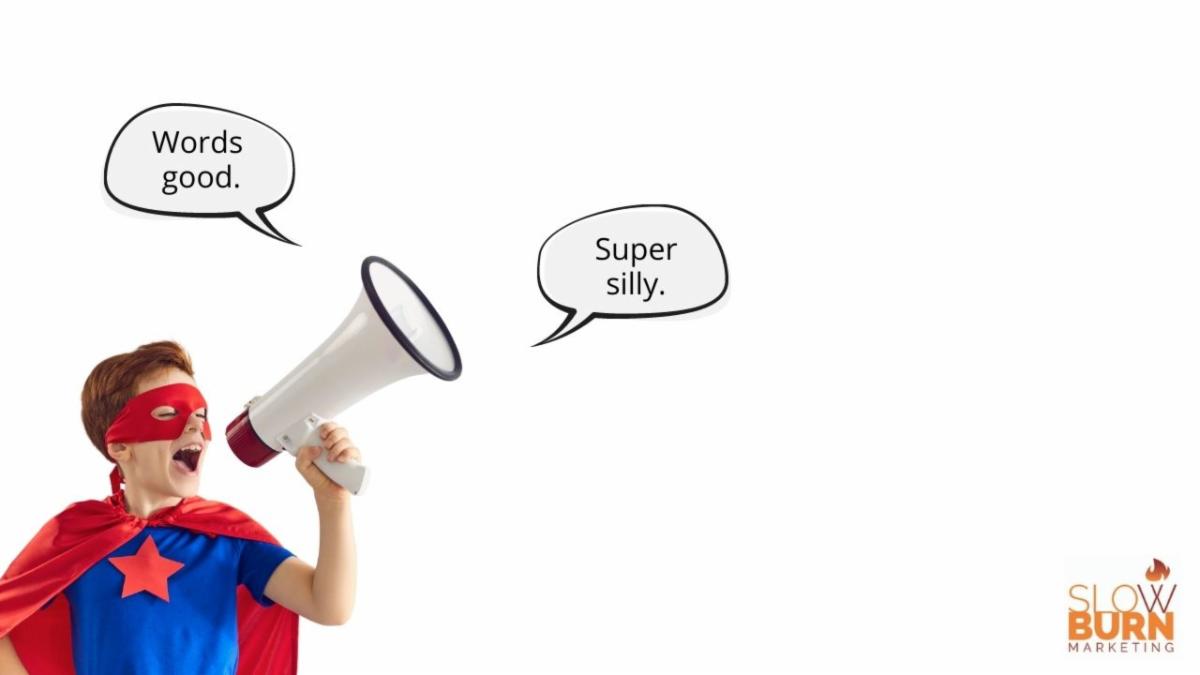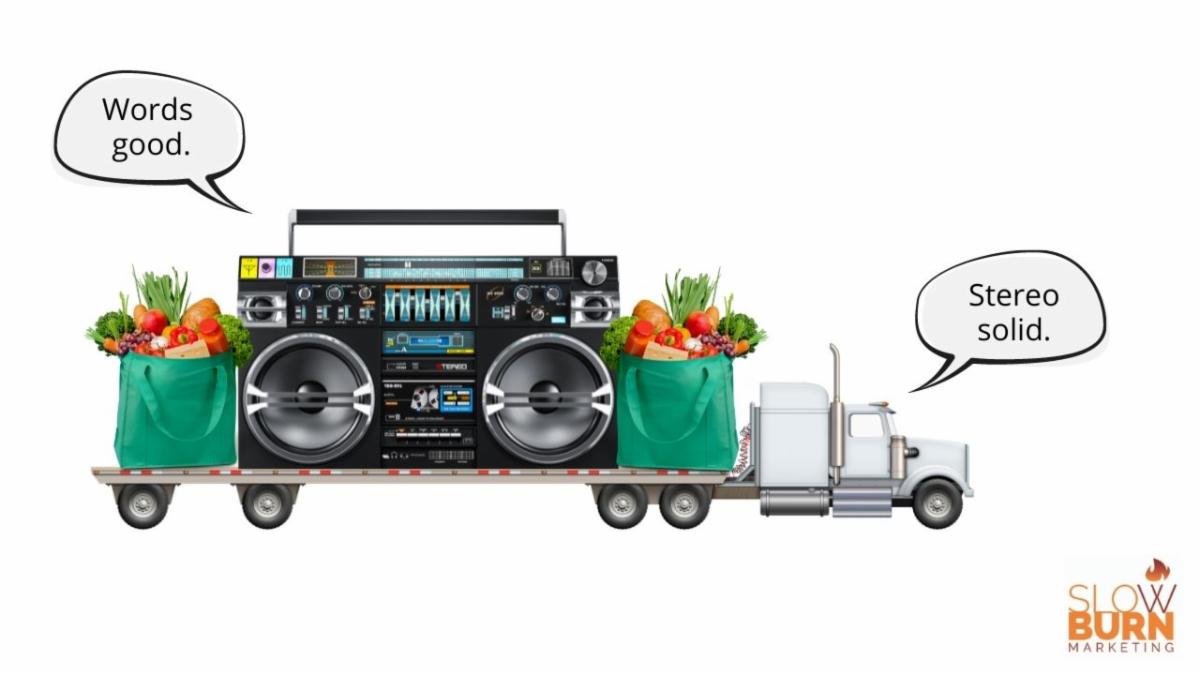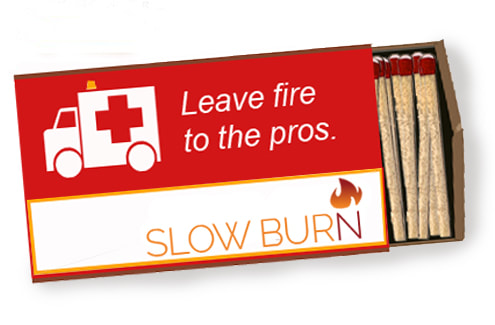|
From “The Chronicles Of I Research These Things So You Don’t Have To…”
Yes, it’s another tale of word curmudgeon detectiveology to help answer the unanswerably nagging question: “What the hell happened?” In this episode: Super Adverb! Yes, it’s possible that you’ve turned a deaf ear to “awesome,” “amazeballs” and “awesomesauce,” but your camel’s back has broken beneath the straw of ultra-awesomeness in the attack of the adverb, “super.” If you’ve wondered how this all happened, I believe I may have discovered the culprit in the great super avalanche (superlanch?) of the 21st century. Ready? Tinder Did It! The super-ubiquitous dating app first introduced the phrase “swipe left” as an all-purpose metaphor for dismissing someone as unsuitable. And then, Tinder brought us the ridiculousness of supersizing that which does not require it. The great day of the super-stupidsizing was September 9, 2015. That is the day that Tinder introduced a new button designed to help one express, to an extreme degree, their attraction to a prospective bedfellow, er, hookup, er, partner (there we go!) by clicking on a new button that expresses more than mere “like.” The new button of 2015 was “Super Like.” And who doesn’t want to be Super Liked? Moreover, Tinder assures us that by using this button, “The person you Super Liked will take notice.” (This button is not merely a thumbs-up or a double thumbs-up or an amazeballs emoji, but a blue star which looks vaguely like a puckered blue orifice—and who doesn’t super like that?) With apologies to the geniuses who have made Tinder so super successful that it surpasses Netflix in terms of subscriber dollars spent: we must take notice that being super-liked is super-silly. Is merely liking something or someone no longer sufficient? Why is adding one’s own words too much? Is it that it requires a) thought and b) words? Clearly, there is an excessive burden presented by the time that original thought robs from one who is attempting to thumb-like as many prospective bed buddies as possible in one session of swipe-and-tap date shopping by phone in the worst possible evolution of mail-order assignation (a new term I’ve just invented, what with mail-order bride-ness now being antiquated and beyond sexist and super-laughable, as how does one attach a bride or a groom to an email?). And yes, faithful reader, you will notice that some of the sentences herein are super-complex. They’re violating your faithful scribe’s borrowed dictum from David Ogilvy, to wit: thou shalt not write any sentence longer than 13 words. But this verbal violation seems super necessary at this super moment in history where our language is being super bogged down by the superlative double whammy of ambiguous, confusing, style-abhorrent, non-agreeing if gender-neutral pronouns and the invasion of super ridiculous, tech-bred speakiness into the vernacular. Majorly un-cool, dudes and dudettes. What can be done? How about we super-investigate superalternatives to super-izing everything? Quick! Rush to the rescue station! Break the glass on the emergency super-thesaurus case and thumb over to words like “superbly,” “superlatively,” and “superly” (the latter being super-awful sounding but at least a legitimate word). Or, better yet, forget the thesaurus entirely. Instead, when someone uses “super” in a capacity that you might deem ill-advised, turn it back on them. “Did you just say your steak is super amazing? “Does that mean the great surprise and astonishment of mere amazement is insufficient to describe the power of that char-broiled beef upon your palate? “How much more transported beyond simple astonishment are you? “Will your spirit be leaving your body here at the table, requiring the bus boy to clear away your limp and lifeless carcass? “Or will your head simply fly from your neck, which will then shower us all in bloody amazeballs? “Or, is it simple enough that we should just go find you an adult diaper? How super amazing is it going to get and do I need a plastic sheet as if I were in the front row at a performance by that comedian who uses a giant mallet to smash watermelons? "Explain thyself, dear friend.” OK. Perhaps that is excessive. Here’s another idea: let’s place a moratorium on adverbs. They’re often the majorly weakest part of verbal expression. Writing and speaking free from adverbs is potent. And maybe the example can leach into the culture. Perhaps the thoughtless offenders of superdom will notice they sound out of step. They’ll reevaluate the awesomeness of their word choices. But I super doubt it. Until the superstorm passes, we will have to suffer the foolishness. Super swipe left. Cheers, Blaine Parker Your Lean, Mean Creative Director in Park City LIGHTNING BRANDING ON AMAZON The Kindle edition of our new book is now available at Amazon for the REDUCED bargain price of $9.95 For details about our new Lightning Branding courses, both do-it-yourself and we-do-it-with-you editions, click here. (There's even a video of us!)
0 Comments
The Foreign Invasion: They Live Among Us!
The words, that is. Foreign words live among us insomuch as language is alive. (That’s versus not “dead,” e.g. Latin, Sanskrit, Coptic, Akkadian, et. al.) Invaders of the day? The word “stereo,” which means “solid,” the word “truck,” which means “barter,” and a New Orleans idiom for going to the supermarket, “Makin’ groceries.” Nothing in the lexicon of United States English is as it seems. Our language is a pastiche of foreign words and phrases and translations that have invaded the zeitgeist at various times and have been assimilated for whatever reason. This vocabularic cultural habit makes English, especially our brand of it, a nightmare for the foreign speaker who has to navigate the minefield of explosive idiom with care and dexterity lest they be blown to bits by a metaphorical munition that meant no harm but destroyed an otherwise perfectly passive thought. Why is your relentless scribe ranting about all this? It began while thinking about good words for Words Good. That’s where “stereo” came into the equation. Back in the day, when high-end stereo equipment was part of my professional life, the word’s etymology was a revelation. Learning that the word has nothing to do with “two” (as in a pair of stereo speakers), and everything to do with creating a solid portrayal of sonic reality made new sense. This simple tidbit changed my understanding of both the medium and of my job. The word “stereo” comes from the Greek word, “στέρεο.” Go ahead and plug that startling little collection of characters into Google Translate. Google’s polyglot gods of everything will tell you that the word means “solid.” (And if you ask Google to pronounce the word, it sounds oddly like "stereo.") The other part of the entire original word, “phonic,” as in “stereophonic” (we Americans love to truncate everything to prevent our tongues from tiring on polysyllabic overwork) means “sound.” A solid sound. Real. With length, width, depth and dimension. The word “stereophonic” was given to us by the American electrical engineering and manufacturing company, Western Electric. Ironically, the medium of stereophonic sound as we know it was given to us by the English in the 1930s, courtesy of EMI. Once again, two cultures divided by a common language and disparate engineering philosophies. Then, Huck Finn drifted across my radar on a raft. He came bringing with him the word “truck.” As in, “I don’t hold no truck with the likes of you.” What the truck? From context, I always took “truck” to mean that there was no involvement, and the “no-trucker” was not buying whatever the subject was selling. Well, eventually, your scribe needs to know. And it seems that in the context of 1800s Hannibal, Missouri, “truck” comes from the Old North French word “torquer,” meaning to barter or exchange, and has its roots in Medieval Latin. And somewhere in all this word salad, I was reminded of one of my favorite local idioms when I met a small-business entrepreneur in Mississippi whose company is called, “Makin’ Groceries.” That idiom is unique to New Orleans, and means that you’re going to the supermarket. I’ve known this phrase for years, and it’s always been a headscratcher until just yesterday. That’s when I finally put it together with New Orleans’ French heritage. The French use the verb “faire,” to interchangeably mean “to do” or “to make.” Looking at the French, “faire des courses,” one can literally translate the phrase to English as “Makin’ groceries.” These are the kinds of nonsensical things that bang (!) around inside my brain like the little white balls in the lottery numbers machine. The difference is that instead of numbers, each ball has a word on it. (And in case you’re wondering, that machine with the little white balls flying around inside is called an “air mix” machine. Bonus words good!) Anyway, all this to say: English is a crazy mixed up language of foreign influence that screws with us daily. So, what is your personal favorite unusual word or phrase? Is it uniquely colorful? Does it mess with people’s heads? Has its etymology changed the way you view things? Send or post your reply by the end of the week. (That’s 12/10/21.) We’ll feature you and your reply here in the screed and put you on the road to another few seconds of your 15-minute fame allotment. Now go make groceries with no truck in nonsense and do it in stereo. Cheers, Blaine Parker Your Lean, Mean Creative Director in Park City LIGHTNING BRANDING ON AMAZON The Kindle edition of our new book is now available at Amazon for the REDUCED bargain price of $9.95 For details about our new Lightning Branding courses, both do-it-yourself and we-do-it-with-you editions, click here. (There's even a video of us!) |
AuthorBlaine Parker is prone to ranting about any and all things related to brand. In many ways, he is a professional curmudgeon. While there is no known vaccine for this, the condition is also not contagious. Unless you choose it to be so. Archives
February 2022
Categories
All
|
|
© Copyright 2020 Slow Burn Marketing LLC |



 RSS Feed
RSS Feed

